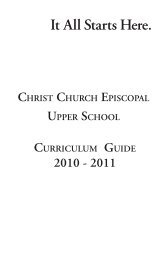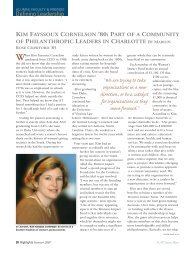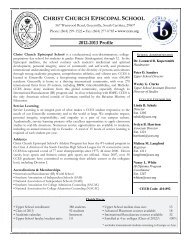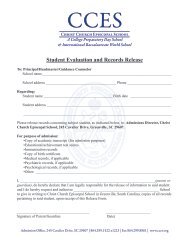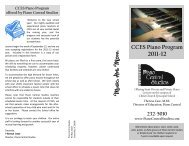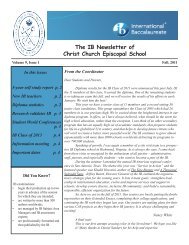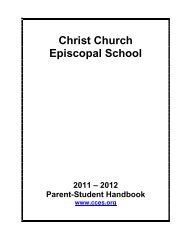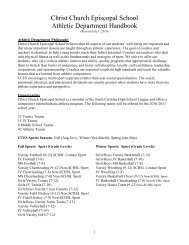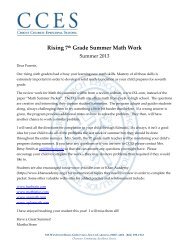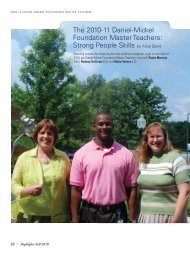LOOK INSIDE LOOK INSIDE - Christ Church Episcopal School
LOOK INSIDE LOOK INSIDE - Christ Church Episcopal School
LOOK INSIDE LOOK INSIDE - Christ Church Episcopal School
Create successful ePaper yourself
Turn your PDF publications into a flip-book with our unique Google optimized e-Paper software.
‘ArabSpring’rages onTJ GibsonManaging EditorRecent elections in Egypt and Tunisia have successfullybegun the process of stabilization in the MiddleEast; however, the Arab Spring must not be thoughtfinished. The Syrian people are still working, and, insome cases, fighting for their rights and freedoms. Discontentedcitizens have come out en masse to protestthe authoritarian regime and human rights violationsof President Bashar al-Assad. Thus far, these protestshave been met only with government crackdowns andsectarian violence, most notably in the area surroundingthe city of Homs.State terrorism in the face of popular protestshas led to the creation of both violent and non-violentrevolutionary groups that are gaining legitimate powerin Syria and throughout the world. Secular and Islamistgroups, such as the Free Syrian Army, have becomeleading assets in the protection of Syrian humanrights, protecting protesters and providing a safe havenfor military defectors. Applying lessons learned fromNATO involvement in Libya, these non-governmentaland paramilitary organizations can prove effective ifgiven guidance and support. If a stable Syrian governmentthat respects the basic rights of its people is to bea reality, there must be an international show of supportthat goes beyond simply “calling” on the Syriangovernment or the weak stance of the Arab League.The creation of a No-Fly-Zone in concordance withopen political support and economic sanctions wouldprovide political legitimacy for these upstart groupswhile simultaneously working to protect the people ofembroiled areas such as Homs. NATO would be anobvious choice to enforce a No-Fly-Zone; however,Turkey would make a much better candidate. Turkey’sclose proximity and historical ties with Syria garners itgreater respect among the Syrian people and would resultin a greater legitimacy of the action. Furthermore,Turkey’s secular democracy rooted in moral Islamhas been openly viewed as the ideal modern Muslimstate. Turkey, a non-Arab but overwhelmingly Muslimnation, has a unique opportunity to act as a force ofstability in the Middle East without creating fears ofWestern Imperialism.Violence and Turmoil in Syria cannot be ignored.If the Arab Spring has taught anything, it is that actionsand ideas spread like wild-fire through the region. Justas civil discontent and upheaval spread from Tunisia,unchecked sectarian disputes can have the disastrouseffect of sparking religious fragmentation throughoutthe Middle East. The Sunni majority of Syria hasbecome critical and suspicious of the Alawite and<strong>Christ</strong>ian majorities. Assad, an Alawite himself, hascreated a disproportionately minority-led government.As Syrians turn on the Assad government, it appearslikely that they will to turn on the minorities that hehas come to represent. Sectarian violence has plaguedevery Arab state, and must be kept from forming inSyria and/or spreading through the region at all costs.In this, much like in the revolutionary aspect, a moreIslamic approach is preferable to a Western one. It isin this that the so-far ineffective Arab League mustdo its part in the protection of human rights for all inSyria. Words alone will not be enough; actions mustbe taken. Sadly, it is doubtful that the Arab Leaguewill step in to do its part, as its member nations are, inmany cases, in no place to cast judgement upon theirSyrian brothers.5cavalier campusFebruary 2012Achievement Center Plansto Better Serve StudentsJordan PentaleriEditor in ChiefThe newest addition to the CCES Campus willarise in the basement of the chapel. The new AchievementCenter will unite all current tutoring services and add newcourse options for all students primer through 12th grade.Some of the courses include specialized readingcourses for 3rd and 4th graders, reading comprehension andforeign language course work for 5th-8th graders as well asindividual tutoring.In addition, many enrichment courses, such as theDuke TIP program’s creative writing class or a keyboardingclass will be offered. Previously these courses wouldnot have been available to students at CCES because theyrequired a mentor. However, the achievement center plansto set up new these new opportunities. The center will givestudents “the time, the place, the structure they need,” saysPam Kaizar, the Achievement Center Director.One Achievement Center program, Readak, has alreadybecome very popular as almost 70 students are a partof the study skills course.Another opportunity for the Upper <strong>School</strong> is a hybridforeign language class that will be partly online andpartly on campus. The goal is to give students, especiallythose who did not take foreign language in middle school,support to make the transition to Upper <strong>School</strong> easier.Ms. Kaizar outlined that the “goal of our achievementcenter is that some point between primer and 12thgrade, we should have some service that students would liketo take advantage of. Every child will have the opportunityto travel through in their career at <strong>Christ</strong> <strong>Church</strong> for supportand services that come out of there.”Students of all learning levels will find classesavailable to them in the new Achievement center. The Centerplans to bring together all the various tutoring programsalready present in the school under one roof. Currently, tutoringservices are spread in random closets, classrooms andoffices throughout the school but now the center providesa place for tutors to have a quiet place with a board anddesks.Ms. Kaizar noted that for something an instructoris hired, students will have to pay an additional fee.However, services already in place, such as directed studiesin the Upper <strong>School</strong> or non-foreign language classes inthe Middle <strong>School</strong>, will not have any additional fees. Mostparents who will utilize the services are already paying fortutoring services once or twice a week, Ms. Kaizar hopesto “provide something of equal or greater service for lessthan what they are already paying.”The center will have 4 classrooms that can be expandedinto one large room with moveable walls (#5 on theblueprint below). Ms. Kaizar said they designed the spaceto be “as flexible as possible so it meets lots of needs. Inthe evening we can open it up for a meeting with parents, orduring exam time we can divide it up and give group testing.”The space also has room for a teacher and parentresource library, offices, a conference room and a prayerroom. The conference room will be accessible to studentsand will be used to alleviate scheduling issues with the Upper<strong>School</strong> presentation room, especially when colleges visitin the Fall. The prayer room, dubbed “A Prayer’s Place”by Father Richard, will keep with the episcopal traditions ofthe school, and fits well with the sacred space under whichthe center will be located.Ms. Kaizar was excited by the idea that the centerwill be under the chapel. She stated that “In my opinion, itfits so well with the <strong>Episcopal</strong> mission of inclusiveness, sothe [chapel] is the perfect place for it to be.”She continued with, “We are a college preparatoryschool and everyone who graduates will go on to collegeand that is not going to change. Everyone learns in adifferent way and meeting those needs in the realm of acollege preparatory school is our goal.”1. Professional Development & Parent Resource Library 2. Auxiliary Tutor Area 3. Director’sOffice 4. Second Office 5. Flexible Classrooms 6. Conference Room 7. Large TutoringRooms 8. Small Tutoring Rooms 9. A Prayer’s PlacePhotos courtesy of Pam Kaizar



